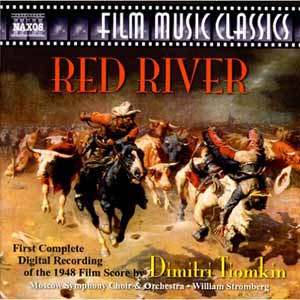************************************************************** EDITOR'S CHOICE December 2006 **************************************************************
Red River
Music composed by Dimitri Tiomkin
Performed by The Moscow Symphony Choir & Orchestra
Conducted by William Stromberg
Music reconstructed by John Morgan
Available on Naxos (8.557699)
Running Time: 63:51
Crotchet Amazon UK Amazon US

See also:
Red River (previous release of this recording) How odd it is that Dimitri Tiomkin, the Ukranian-born composer who was probably film music’s first real superstar, should be so associated with westerns, such a uniquely American genre (well, at least until Sergio Leone appeared on the scene some decades later). But then, I suppose Tiomkin’s shamelessly overblown music was naturally at home in these larger-than-life tales. Perhaps his very finest score was Red River, the 1948 movie directed by Howard Hawks. John Wayne stars in what many rank as one of the greatest westerns, with all the classic ingredients: a journey out West to build a family and, hopefully, find fortune. Aaron Copland was suggested to write the score, but Hughes held out for Tiomkin, with whom he had enjoyed working in the past.
Tiomkin did westerns in a rather different way from the vintage Copland / Moross / Bernstein sound – but one which worked just as well. Listen to a few bars of the score – pick any few bars at all! – and you’ll be in no doubt that you’re in cattle country. His music is filled with so much colour, such vivid imagery. It is a showman at work: this is music designed to be at the forefront of a movie, almost to make it seem like the images were created as accompaniment to the music, rather than the other way around. For many years, Red River was one of the “holy grails” of Golden Age film music fans, and in 2003 the score was finally released for the first time – not the original tracks but, given the quality of sound, perhaps something even better – a new recording, with William Stromberg conducting the Moscow Symphony Orchestra and Choir, John Morgan having reconstructed the score. The Stromberg/Morgan team has produced some classic recordings of vintage film music for the Marco Polo label, and many of those recordings have now been reissued at cut-price on Naxos, this being the latest. Arguably, this is the pick of all their recordings, maybe the orchestra reacting subconsciously to finally getting the chance to record film music by “one of their own” – the music is highly-evocative of the American west, absolutely; but there are also strong hints of the great Russian composers, particularly Shostokovich, from the muscular brass through the deep male choir.
Tiomkin’s music is built, as all the great western scores are, around an outstanding core of themes, some of which sound like they could easily be folk songs, but in fact aren't – the composer seems to have deliberately written music which sounds like folk music but is actually original. The portentous opening title music sets the tone, wonderfully rich and colourful, with Tiomkin's trademark chorus in tow, but there's (mercifully) no cheery song here. One only has to reach the second track, "Dunson Heads South", to discover one of the score's true highlights, an affecting piece filling a dual role of representing great emotion while evoking the beautiful landscape as well.
There is no shortage of powerful action music here, some of which could well surprise some listeners, who expect music from a film like this to be all cheerful and bright: the furious "The Red Menace Strikes" is the earliest, a dark and powerful piece of orchestral aggression. "Stampede" is another - surprisingly dissonant, the orchestra seems almost in conflict with itself at times; quite brilliant, maybe the score’s highlight. Some of the music for the later fight scenes sounds almost swashbuckling - "Fight for Life" could perhaps have come from The Sea Hawk or something, but is never quite so breezy; what it is, is incredibly detailed, nuanced action music. Of course, there is also a smattering of majestic, ceremonial-style music for some of the film's bigger moments, with two tracks in the album's centre - "Red River Ahead" and "Red River Crossing" - being a fine example when taken together. Like all great western scores, there’s also plenty of tender thematic material for the romantic scenes: they come no finer than "Foggy Night Surrender", featuring an exquisite passage for solo violin. As the movie (and score) reach their climax, Tiomkin lays on fully orchestral versions of his main theme thick and fast, notably in "A Joyous Meeting" and "Approach to Abilene". The choir appears in "A Big Day in Abilene", providing an almost carnival-like atmosphere. "A Message for Matt" begins as a suspenseful piece, the calm before the storm perhaps, before going into a beautiful, subtle rendition of the main theme; and then everything explodes to high heaven in "The Challenge", the final, dark musical battle. Everything then ends with the triumphant, rousing finale "The New Brand", a great way to go out.
Red River is a magnificent film score, perhaps Tiomkin's best; and this recording is magnificent. Musically, the Naxos release is identical to the previous Marco Polo one, but there are differences in packaging: the magnificent 32-page booklet highlighted by a wonderful essay about the composer, director and film by Jack Smith has been considerably truncated, and the photos – which reported caused a copyright dispute and led to the Marco Polo album’s withdrawal from the US market before it had even been released there. It’s impossible to recommend this release highly-enough – flawless film music, given a flawless performance, at a low price.
James Southall
Rating:
5
Return to Reviews Index